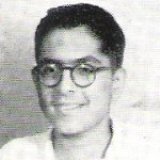


- Ernest Haskell - When in Std VII
Looking back along the way of the steady march of science down to the earlier known stage of Alchemy as practiced in the Middle Ages we perforce must make a long and respectful halt at one of its most glorious milestones – ROGER BACON the scientist who lived in the thirteenth century.
Roger Bacon was born in Soersetshire in the year 1214. He came into the world when England was facing a crisis in her history. King John was on the throne and the Magna Carta which later gave England her national liberty was not yet signed. As if to coincide with his struggle for freedom in the realms of science this significant charter came into existence a year after Bacon’s birth.
Bacon was a keen student from his youth and was Paris was the centre of learning in Europe at that time, he was sent there for further scholarship. In Paris Bacon met the clever Master Pierre a scholar who was indifferent to fame and rewards and who pursued his studies in secret. Recognizing the genius of he young Englishman he became his great friend. These two friends labored night and day over a variety of studies. As most European books were written in Latin they mastered this language; after which Greek. Then in order to understand Alchemy more thoroughly they studied Arabic. During this period of study, they discovered that a mixture of sulpher and charcoal would explode like gunpowder. In this period also Roger Bacon invented the magnifying glass. Now came the sad time for Roger Bacon to wish his friend good-bye and return to England. In 1250 he joined the Order of the Franciscans and soon started imparting his great store of knowledge to a large following of students at Oxford. By night he worked late studying the stars. But Bacon’s good times were coming to an end. His fellow monks were jealous of him, and one night seeing smoke from his tower (which was really the result of experiments) they accused him of black magic. Bacon was tried by the leader of the Franciscans and sentenced to banishment from Oxford. He was kept in Paris where for six years he was fed bred and water and forbidden books, writing material and scientific instruments. Due to the Pope Clement VI who greatly appreciated Bacon’s learning he was freed from Prison in 1268.
Returning to Oxford Bacon resumed his studies in the tower. But again the smoke and sounds resulting from these experiments revived the old charge against him. This time he was again returned to Paris to suffer fourteen long years of solitary imprisonment. However in 1292 he was released owing to the efforts of the new Head of the Franciscans. AT the age of 78 he journeyed home for the third time and because of his ardent zeal wrote another book. He died in the year 1294 at the age of 80. The people (still fearing what they considered evil dealing) buried his writings with him. When these were unearthed 200 years later the world realized what a genius this monk was. This great philosopher going un honored in his own time still left such rich legacy to succeeding generations and these in turn have gratefully acknowledged the master remembering him as THE PHILOSPHER WHO LIVED TOO SOON.